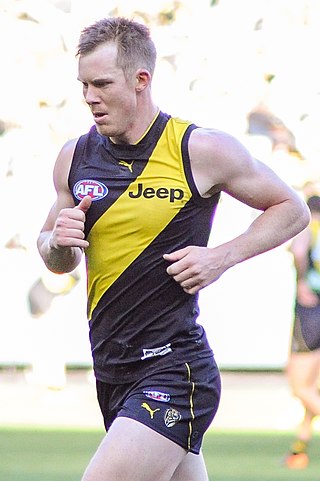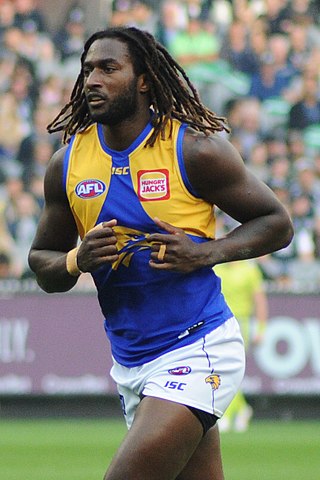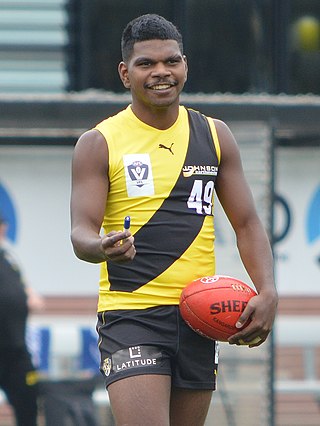Gavin Adrian Wanganeen is a former Australian rules footballer who played for the Essendon Football Club and Port Adelaide Football Club in the Australian Football League (AFL), and also for the Port Adelaide Magpies in the South Australian National Football League (SANFL).

Adam Roy Goodes is a former professional Australian rules footballer who played for the Sydney Swans in the Australian Football League (AFL). Goodes holds an elite place in VFL/AFL history as a dual Brownlow Medallist, dual premiership player, four-time All-Australian, member of the Indigenous Team of the Century and representative of Australia in the International Rules Series. In addition, he has held the record for the most VFL/AFL games played by an Indigenous player, surpassing Andrew McLeod's record of 340 during the 2014 AFL season before having his own record surpassed by Shaun Burgoyne during the 2019 AFL season.

Benjamin Luke Cousins is a former professional Australian rules footballer who played for West Coast and Richmond in the Australian Football League (AFL). Cousins is listed by journalist Mike Sheahan as one of the fifty greatest players of all time. During his 12-year, 238-game career with West Coast, he won several of the league's highest individual awards, including a Brownlow Medal, Most Valuable Player and a premiership medallion. He was also selected six times in the All-Australian Team and represented Australia in the International Rules Series. He was West Coast's club champion for four seasons and captain for five seasons.

Brendan Fevola is a former professional Australian rules footballer and radio presenter. He played with the Carlton and Brisbane Lions football clubs in the Australian Football League (AFL).

Peter Jason Matthew Helliar is an Australian comedian, actor, television, radio presenter, writer, producer and director. He is best known for his work on television as a former regular co-host of The Project on Network Ten from January 2014 to December 2022, replacing previous presenter Dave Hughes to host alongside Carrie Bickmore, Waleed Aly and Lisa Wilkinson. Helliar also appeared with Rove McManus as his sidekick on The Loft Live from 1997 to 1998, on Rove from 1999 and 2009 and in Before the Game as alter ego Bryan Strauchan. Helliar initially worked the Melbourne comedy circuit in the mid-1990s, performing in various venues and the annual Melbourne International Comedy Festival. He has performed in numerous television ads, most notably for Fernwood Fitness. Helliar has been nominated for the Gold Logie, a prestigious award bestowed upon the Most Popular Personality on Television in 2017.
The 2005 AFL season was the 109th season of the Australian Football League (AFL), the highest level senior Australian rules football competition in Australia, which was known as the Victorian Football League until 1989. The season featured sixteen clubs, ran from 24 March until 24 September, and comprised a 22-game home-and-away season followed by a finals series featuring the top eight clubs.

Anthony William Mundine OAM is an Australian former boxer, and one of the country's most accomplished Indigenous fighters. The only Australian boxer to compete professionally in four weight divisions, he held the Australian middleweight, light heavyweight, cruiserweight and heavyweight titles, as well as the Commonwealth middleweight and light heavyweight titles. He also challenged once for the WBA world middleweight title in 1974.
Justin Murphy is a former Australian rules footballer who played for the Richmond Football Club, the Carlton Football Club (twice), the Geelong Football Club and the Essendon Football Club of the Australian Football League (AFL).

Daniel Alan Kerr is a former Australian rules footballer who played for the West Coast Eagles in the Australian Football League (AFL). He played 220 games for the club between 2001 and 2013, as a hard-running inside midfielder.
The John Worsfold Medal is an Australian rules football award presented annually to the player(s) adjudged the best and fairest at the West Coast Eagles throughout the Victorian Football League/Australian Football League (VFL/AFL) season.

Stuart Dew is an Australian rules football coach and former head coach of the Gold Coast Suns in the Australian Football League (AFL). As a player, he played for the Port Adelaide Football Club and Hawthorn Football Club in the Australian Football League. Dew was acknowledged as being a long penetrating left foot kick of the football.
The AFL Commission is the governing body of the Australian Football League Limited (AFL), its subsidiaries and controlled entities. Richard Goyder has been chairman since 4 April 2017, replacing Mike Fitzpatrick.

Solomon Haumono is a former professional boxer and former rugby league footballer of Tongan descent.

Jack Riewoldt is a former professional Australian rules footballer who played for the Richmond Football Club in the Australian Football League (AFL). He is a three-time premiership player, a three-time Coleman Medallist, a three-time All-Australian, an 12-time Richmond club leading goalkicker, a two-time Jack Dyer Medallist and a Tasmanian Football Hall of Famer. He served as Richmond's vice captain during all three premiership seasons.

Cyril Rioli is a former Australian rules football player who played with the Hawthorn Football Club in the Australian Football League. Rioli was a member of four premiership teams and was the Norm Smith Medallist in the 2015 AFL Grand Final.

Nicholas Naitanui is a former Australian rules footballer who played for the West Coast Eagles in the Australian Football League (AFL). He was born in Sydney to Fijian parents, and his family moved to Perth, Western Australia after his father's death. Growing up in Midvale, Naitanui attended Governor Stirling Senior High School, and played football for the Midvale Junior Football Club. After representing Western Australia in the 2007 and 2008 AFL Under 18 Championships, he debuted in 2008 for the Swan Districts Football Club in the West Australian Football League (WAFL). Naitanui was drafted by West Coast with the second pick in the 2008 National Draft.
Pippa Grange is a British applied psychologist, author and the Head of People and Team Development at The Football Association until the end of 2019. She is the founder of the consultancy Bluestone Edge.
The Final Quarter is a 2019 Australian documentary, directed by Ian Darling and produced by Shark Island Productions, about the final stages of the Australian football career of Adam Goodes, during which he was the target of repeated booing by opposition fans.

The Australian Dream, also known as Australian Dream, is a feature-length documentary film released in Australia in 2019. Featuring Australian Football League (AFL) player Adam Goodes, the film examines Australian Aboriginal identity and racism in modern Australia, with the sustained booing of Goodes by spectators as a starting point.

Maurice Rioli, Jr. is a professional Australian rules footballer who plays for the Richmond Football Club in the Australian Football League (AFL)














